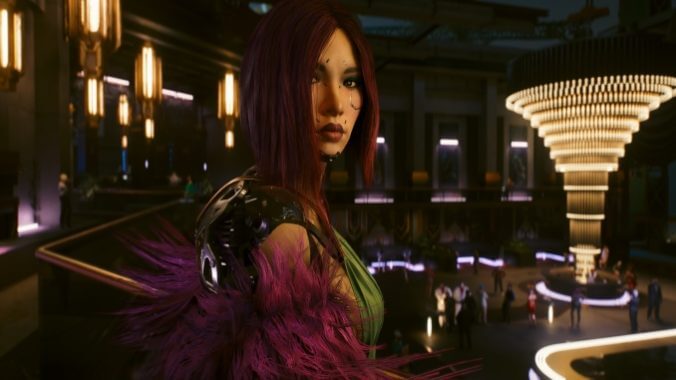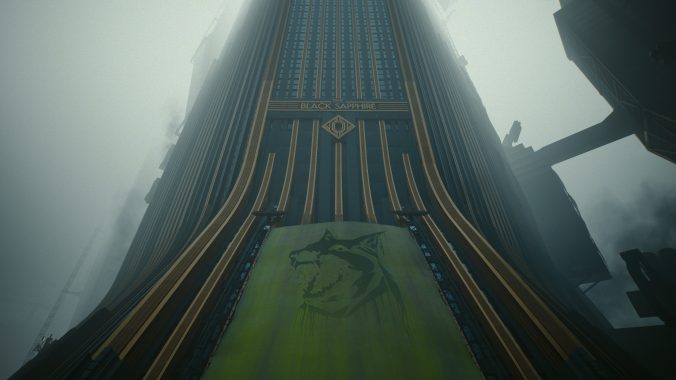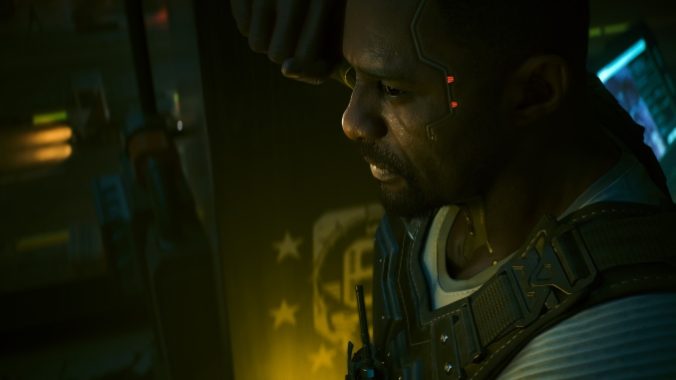
Spoilers for some side quests in Cyberpunk 2077 and its expansion, Phantom Liberty.
Here are some vignettes from my time in Cyberpunk 2077 and its lone expansion, Phantom Liberty. Note the differences.
In one, I was tasked by a bartender to follow his wife, who he suspected was cheating on him due to the curious places she found herself in and the expenses he noticed her racking up while she was away. Following her into a building that looks ripe for affairs all but confirms that her infidelity is in fact assured, but tracking down the exact room she’s in revealed that she was seeing a “rippderdoc,” Cyberpunk 2077‘s extrapolation of a back alley plastic surgeon. They can alter a person’s appearance or “chrome them out,” essentially giving them cybernetic enhancements that range from better eyes to extravagant—and deadly—mantis blades. The wife revealed in a panic that she wasn’t there to cheat, but to keep on top of her image. It turns out she wasn’t born the way she appears, not even remotely. Worried that her husband might reprimand and leave her if he were to find out, she begged me not to tell him. Of course, because I’d already been asked to interject in the relationship, and value honesty, I told the husband the truth rather than allow him to think he’s been cheated on. He panicked at the revelation and spiraled before I shook him awake and reminded him that the chrome and extensive visual overhaul doesn’t make a person, nor does it rob them of their personhood and the relationships they fought for. If he loved her before ever knowing that she changed her appearance so drastically, it’s incredibly likely that her appearance isn’t what has kept them together, it’s their mutual love and respect. This was one of my favorite early bits of the game even if it asked very little of me as a player because it showed there was perhaps some depth to the game’s setting and writing that wasn’t always evident—a fact I wasn’t privy to given how the critical discourse around the game played out some years ago.
In Dogtown, the walled-off remains of a district that could’ve been and Phantom Liberty‘s new setting, I was given a job to save two shady officers after a deal with a local gangster had gone sideways. Hilariously, this quest began with another panicked conversation, this time in a car with a third officer, Stella, who asked me to recline in the passenger seat so as to avoid any undue attention, all the while the very people she’s hoped to evade are literally right outside the window .Though I pointed out the futility in this approach, I nonetheless heard her out and took on the gig. Before I left, she pleaded with me to spare the goons keeping her friends captive in the precinct so as to not piss off Dodger, the aforementioned gangster, even more. I’d finely honed my character to this point as a stealth-oriented netrunner, complete with optical camo and quickhacks that allowed me to take enemies out without killing them from a distance. I hacked and choked my way across the room to eventually reach an elevator that brought me to my targets, Bill and Charles, or Dumbass One and Two and a thoroughly eviscerated corpse before them. The corpse, which stole some drugs these officers needed to return, opted to ingest them and overdosed. In the hopes of getting them back, the officers cut him open, only to find the drugs dissolved. Now, they just kind of needed safe passage out of this place and to hopefully avoid Dodger the whole time, which we found impossible to do as he rolled up to the garage their squad car is in just as they’re about to make off. I told Dodger that I was just as befuddled by my presence here as he was and ratted out Bill and Charles who opted for weaseling out with a lie. They eventually corroborated the insane story I told Dodger and he…let them go, saying he’d trade that bag of drugs for a laugh and a tale of that measure anytime. Then one of his goons ran a biometric scan on the building: since no one died, Dodger gave me the all clear to leave peacefully.

This mission is easily one of the highlights of my dozens of hours spent in Night City, smartly melding a light touch of humor with the humanity that Cyberpunk 2077 has in spades, especially the deeper you get into the game. I felt rewarded for building my character in such a way that I could meet the specific demands of the quest with relative ease, which is less common in the base game than it is in its phenomenal expansion. It delivers consequences, both positive and negative, for entrenching yourself in the experience as fully as you can. This kind of depth can be found across the wide span of Phantom Liberty so though it’s been said before, allow me to parrot that this expansion fully realizes the potential of Cyberpunk 2077 in often jaw-dropping fashion.
Night City feels like a real place, and more specifically feels a little like home here in New York City: try and follow the critical plots and you’ll find some intrigue but little to hold onto. It’s in the margins of a city like mine, and a place like Night City, that you find the stories and people worth hitching a wagon to. Folks who’ve known and loved Cyberpunk 2077 for years have extolled about these values in the game; I’ve lost track of the sheer amount of times I’ve heard about the Sinnerman quest line and having experienced it at last, I can confirm it’s as uncomfortable and memorable as it’s always sounded. So are the spate of companion/romance quests that you can embark on in the game’s superior second and third acts after a limp opening. This was always Cyberpunk 2077‘s strength—telling stories about the people often forgotten or neglected by Night City—but also exposes how often it sidelined its best stories and characters. Phantom Liberty makes sure that isn’t the case. It erects Dogtown, a police state led by one Colonel Kurt Hansen, that exists as the remains of an expansion to the city that an earlier war claimed. While it’s free of corpo influence, it’s also simply rundown and unfinished, its partially-paved roads home to a paramilitary force that holds the district and the people who couldn’t even make it in the slums of Night City. The most familiar sounds to the denizens of Dogtown are either Hansen’s daily propagandic broadcasts or the sirens of a Trauma Team AV picking up bodies. The decrepitness of Dogtown simply screams at the player as the expansion shores up the absolute best elements of Cyberpunk 2077, the kind of stuff that you might only have gotten glimpses at in the main game, and builds the game’s most winding, emotionally resonant, and flat-out stunning narrative in the center of it.
When you’re summoned seemingly out of the blue by Songbird, a netrunner and agent for the president of the New United States, you’re called upon to rescue her and the president in a sequence that shows the developers at CD Projekt Red pulling zero punches. Phantom Liberty rarely pumps the brakes from then on, pulling players into a web of lies and deceit that can’t help but feel perfect for a role-playing experience. You’re soon recruited as an agent and join an admittedly tenuous team led by Idris Elba’s Solomon Reed, a character I wanted so badly to trust but could never entirely toss my weight behind, and embark on a series of missions that showcased what the game could’ve been all along. The mission variety is pitch-perfect, taking cues from countless thrillers for influence and tasking players with everything from impersonation to infiltrating highly fortified locales, but what I love most is how rich a roleplaying experience it all is. Every new companion you take on, whether it be the president themself, Solomon, or Songbird, seems like an uneasy alliance, and the script for the game encourages you to question everything you do and everyone who tries to win you over. If your V won’t say it, Keanu Reeves reprises his role as a much more downbeat and contemplative Johnny Silverhand, and gives voice to these concerns and doubts, seeing as he’s got his own complicated story of service to his country. My allegiances to everyone around me ebbed and flowed till the very last monumental decision I made, in large part due to the wonderful performances across the board. Songbird is easily one of Cyberpunk 2077‘s most immediately powerful and endearing characters and one I hope that the series isn’t done with after this expansion is said and done considering what she accomplishes in such a short time. Solomon and Alex, your other FIA ally, are fantastic foils too, and live up to the promise of shaky one-sided relationships that the genre conjures. Myers, the apparent leader of the new free world, adds a dash of chaos to the proceedings that clearly makes her a live wire in the game’s fiction and a huge player to watch as CD Projekt Red continue to build upon that universe.

Complementing this fantastic character work, Phantom Liberty takes a step forward that the base game rarely did and paid off choices I made and relationships I cultivated in ways that surprised me when they reared their heads. In Cyberpunk 2077, there’s a late mission where you’re supposed to find a reporter in a club that is deeply in the territory of a gang you’re probably on thin ice with, meaning you’d have to fight your way through. However, if you saved a guy in one of the earliest missions of the game, he’s now taken on a leadership role in the gang and allows you to walk in and out completely unscathed. It’s the beginnings of a reputation system that wouldn’t feel out of place in Cyberpunk 2077‘s role-playing systems and feels only further codified by the number of times it recurred in the much shorter expansion to brilliant effect. I may have punched Placide, a Voodoo Boy who placed the equivalent of a bomb in my cyberware 20 hours prior, but because I left things on a better note with his leader Brigitte, I was able to get Solomon and myself into an area without having to sneak or blast my way through. Politicking—as well as the deployment of your skills—feels much more potent a weapon in Phantom Liberty than it ever did in the base game, and upon reflection, it’s kind of wonderful how little I ever felt I had to raise my gun or resort to violence in the expansion beyond mandatory confrontations. As I know it, because of the route I picked at the very end, I skipped over a focal boss fight of the expansion; in another instance, I was able to sidestep another boss by deploying a single quickhack and moving on mere seconds later.
I’m playing through the entirety of Cyberpunk 2077 for the first time as I write this, meaning that I’ve had the luxury of only ever really knowing it as the game it was whipped into being over the course of three years. Many patches—including a recent substantial rework of its core progression systems that allows for deeper role-playing—and an espionage-based expansion later, the game feels whole. Imperfect still, but in remarkably good shape for something whose development and release was marred by turbulence and mismanagement so bad it was pulled from digital shelves. A few years, a critically-acclaimed anime, and $120 million later, I’m glad there’s finally something polished to show for and consider it shameful that it’s taken this long to do right by the developers. Phantom Liberty is clearly the kind of thing that the folks at CD Projekt Red are capable of putting out when they’re on a mission and undeterred by c-suite fuckery, and while I’m of the mind that Cyberpunk 2077 more or less came out like it was supposed to—save for arriving early and unpolished—it’s a shame this expansion has been framed as a comeback story rather than a victory lap. Moreover, as an attempt to right a previous wrong, it runs the risk of papering over the sordid history of developing the base game as discourse around it now devolves into tribalistic niches posturing and spouting off at the mouth about whether the game has “always been good” or not, an argument that forgets the turmoil of the creatives at the heart of the work for pointless pissing contests. My hope is that the development of Phantom Liberty was a more creatively fruitful endeavor that fostered a healthy environment CD Projekt Red can carry forward. If the news coming out of the studio is any indication though, I’ll hold my breath on that one.
In spite of it all though, CD Projekt Red has struck it out of the park. Cyberpunk 2077 finally shines the way it was always meant to. I hate talking in anything that resembles platitudes, but Phantom Liberty is an honest-to-goodness triumph. It’s not just the narrative I hoped for out of the original game, it’s everything it ought to have been. It properly sands away the rough and occasionally raw elements and designs of the base game and sharpens its best parts into a weapon like little else. It doubles down and makes it clear this is a world worth telling stories in. It more prominently and earnestly wears its heart on its sleeve, all the while delivering characters and consequences that hopefully ripple outwards in brilliant and bold new ways. It’s everything I could’ve wanted Cyberpunk 2077 to be.
Cyberpunk 2077: Phantom Liberty is developed and published by CD Projekt Red. Our review is based on the PS5 version. It is also available on Xbox Series X|S and PC.
Moises Taveras is the assistant games editor for Paste Magazine. He was that one kid who was really excited about Google+ and is still sad about how that turned out.